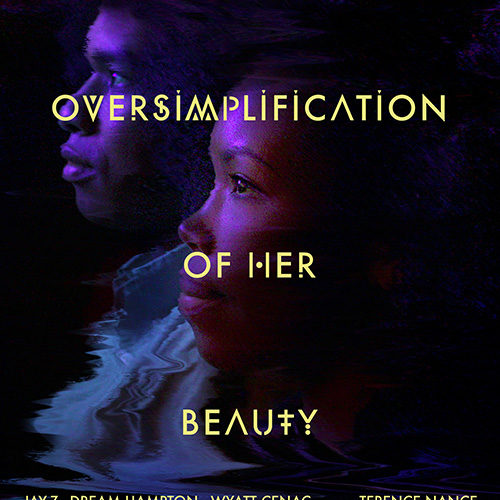It’s not hard to view an experimental art film as little more than a pretentious, self-indulgent exercise in futility when you aren’t willing to give it a chance. In a world overpopulated by faux-witty banter between uninteresting caricatures of people engaged in clichéd situations, the mere act of taking the time to watch a personal tale about the meaning of love in a universal context is a victory. Whether or not the viewer likes the piece almost becomes moot if they decide to ride the wave until its finish. Mainstream audiences want to be uplifted by the happily ever afters of normal guy and normal girl finding romance against all odds. They don’t want to watch the insufferable pain of heartbreak and missed connectivity inherent in our self-sabotaging natures because they already know firsthand.

Terence Nance’s debut feature An Oversimplification of Her Beauty resonates above contrivance and fabrication to strip itself down towards the concept of pure authenticity. The writer/director/star/subject has no delusional aspirations that looking back on his relationship with Namik Minter will show truth incarnate, but he does acknowledge it as his own truth. He peers inside his mind and soul to get at the heart of his insecurities, emotional unavailability, and seemingly constant failure to become more than friends with those he loves and therefore no friend at all when the impossibility of romantic interaction renders interaction itself unwanted. He is honest about his feelings, allows the object of his affection the time to explain herself, and eventually reaches the cathartic conclusion of love being an uncontrollable creature that begins internally and cannot fully spread without external declaration.
While the themes and subject matter are universal, however, the film’s appeal is not. Playing as though an educational video one would watch in a classroom about a foreign country, Nance is unafraid to dissect and recombine his story with multiple animation styles, indifferently monotone narration, and chapter breaks more akin to a textbook than movie. He includes a short film created based upon 2006 footage of his and Namik’s friendship entitled How Would You Feel? as though a VHS tape to start and stop contextually within the feature length work constructed around it we’re watching now. Originally screened to audiences as a fictional depiction of longing and desire, this short is now a one-sided, intimately personal document of a crucial moment in their relationship—what it actually was at the time of its genesis.

We travel back and forth from the repetitive questioning of how we’d feel if the woman we loved canceled a scheduled date that may have officially (finally) sparked a romance to Nance’s in hindsight recollections and hypothesizes of why he felt as he did. Going as far back as his emotionally flawless childhood—The Cosby Effect—to be the beginning of his current insecurities, Nance also spans the multiple loves had and lost before ending at a reunion with Namik to confront her about her feelings and ask whether she felt betrayed watching How Would You Feel? or accepting of her complicity in his diary-like artistic endeavor. Details are gathered, insights are made, and love’s absence of concrete definition is projected via one man’s public depiction of thoughts and actions most hold sacredly secret.
What is so fascinating about the work is Nance’s transparency juxtaposed by his refusal to call it documentary. We often hear mention about how it only gives us half the story—yes, the film talks about itself—and how its self-reflection can only serve to expose Nance to his mistakes and help him grow as a man and an artist. It’s fantastic to see Namik sitting down with him trying to explain her part in everything and call his short film and this by extension a picture of her life with his voice as soundtrack. She experienced everything onscreen yet is detached from its familiarity. Yes she is a main character but her story is completely different—as evidenced by the trailer for a yet to be made (fictional?) companion piece, Subtext. This is Nance’s alone.

And he goes all out to make it so with gorgeous animation, staged visual representations of emotional turmoil, and candid moments of joyous memories permanently saved. There may be some overwrought depictions of thorny roses coiling around his bloodied arm or cartoony metaphors of Namik becoming a sun in the sky, but every clichéd bit of symbolism is contextually relevant in what Nance has set out to portray. He has a lot of fun with storybook tropes as his narrator is censored when identities cannot be revealed and faux reality when the screen starts jumping from bad tracking as his VHS tape is paused and ejected, creating an endearing air that helps us empathize with his plight and know his pain. He lays everything on the line and engages our compassionate souls.
The title represents the minimalistic memories conjured once the things we held dear become fleeting glimpses of their former vibrant selves. Even though Nance has fully-formed representations of Namik at his disposal, you cannot help but understand his connection now being of an outsider looking back rather than a man invested in what once was. She’s one of his loves not meant to be—or at least not yet—and thus can be spied upon with a discerning eye intent on wondering why she possessed such an allure. An Oversimplification of Her Beauty may take a step back from this specific woman but it brings us closer to what she represents. Namik is an embodiment of what we all hope to achieve, a shining ray of light to keep us warm. Just because she may not be the one doesn’t mean another isn’t waiting to be found.
An Oversimplification of Her Beauty is in limited NYC and LA release.

